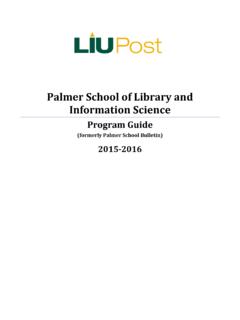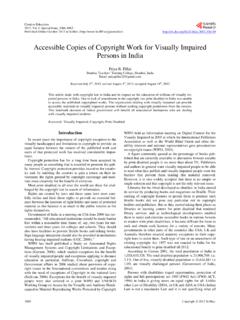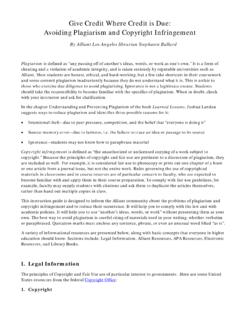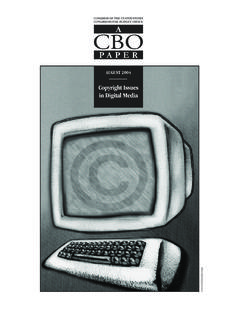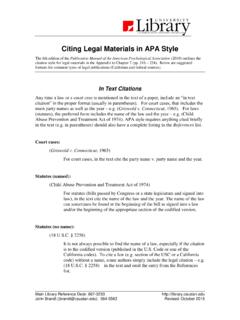Transcription of Copyright and Library Law Syllabus
1 Palmer School of Library and Information Science Long Island University LIS 740: Copyright and Library Law Instructor: Greg Cram Summer II 2016 Syllabus Time and Place Bobst Library , New York University, Avery Room 70 Washington Square South, New York, 10012 Tuesdays and Thursdays, June 21 through July 22, from 6:00-8:00 PM Instructor Contact Information The New York Public Library Stephen A. Schwarzman Building 476 Fifth Avenue New York, NY 10018 Telephone: Email: (always preferable to telephone) Gchat: Office Hours By appointment Prerequisites At least one of the following: LIS 510, LIS 511, LIS 512, or LIS 514; or, with permission of the instructor. Course Description This course explores Copyright law and gives students a legal framework to analyze the Copyright issues faced by librarians and cultural institutions. From the digitization of archives and collections to electronic reference, Copyright is now a major consideration for libraries. Copyright issues are prevalent in published, unpublished and born-digital material.
2 Instead of backing away from Copyright issues to the detriment of access to content, librarians should understand and interpret Copyright law so they can participate in setting institutional policies that take advantage of fair use and other exceptions granted to libraries by the law. Course Objectives Upon completion of the course, the students will: Be able to identify the types of content protected by Copyright , trademark and patent law Gain a firm grounding in the theory and language that underlies Copyright law Be able to analyze whether a copy is an infringement of an exclusive right granted to Copyright holders Understand potential Copyright reforms from different points of view Be able to research and make high-confidence determinations of the Copyright status of items in collections 1 rev. 2016-06 -20 Be able to make well-reasoned arguments as to whether a particular use is a fair use Be able to make well-reasoned arguments as to whether a particular use falls within some other exception granted to users of copyrighted works Be able to identify main features of mass digitization projects and the Copyright co mplications they invite Student Learning Objectives This course addresses all parts of Student Learning Objective (SLO) 1, Reflect the principles, ethics and philosophy of the profession while serving their patrons, institutions and communities.
3 Understanding and applying Copyright principles is increasingly important to fulfill the mission of the profession. This course also touches on SLO 2(c), 3(d) and 5(a). Evaluation and Assessment Students will be assigned four exercises and a final paper that test their grasp of topics taught in class and covered in the readings. Technical aspects, logic, and demonstrations of critical thinking of these written assignments will be evaluated. For full credit, all assignments must be submitted in a timely manner and in a professionally appropriate form. All assignments should be submitted electronically by emailing All assignments are due at the start of the class indicated on the Syllabus (by 6 PM). Regular attendance is required and class participation is expected. This is an interactive class and students will be asked for their thoughts. Because critical thinking and analytical reasoning are essential skills to librarianship, students will also be asked to take and defend positions on Copyright issues in class discussions.
4 There may be times during class where you will be asked to respond to a question by sending a text message or accessing a website. Although a cell phone is not required for this class, you are encouraged to bring one if you have one already. Other than the times where your responses are requested, there should be no active communication via computers or mobile devices during class. Interruptions will affect participation grades. Exercises, the final paper, and class participation will be weighed as follows: Four Copyright assignments/exercises 50% Final 6-10 page paper 25% Class participation 25% Total 100% Course Credits This is a three-credit course. 2 rev. 2016-06 -20 Grading Rubric Written assignments in this class will be graded according to the following guidelines: Late Policy All work is expected to be completed on time. Assignments turned in late (unless excused) are subject to a five percent (5%) penalty for each day after the assignment is due. The last day assignments will be accepted is 5:00 PM on July 22, 2016.
5 Failure to submit an assignment by 5:00 PM on July 22, 2016, will result in a forfeiture of credit for that assignment. Required Texts PETER B. HIRTLE ET AL., Copyright AND CULTURAL INSTITUTIONS: GUIDELINES FOR LIBRARIES, ARCHIVES, AND MUSEUMS (2009), (hereinafter HIRTLE). In addition, a supplemental list of readings is included for each class. Please come to class having read all readings assigned for that class. Judicial opinions are particularly important because they will be the foundation of classroom discussion. Citation Style There is no one preferred citation format for this class. You should feel free to select one of the major formats you are most comfortable with ( , APA, MLA, Chicago, or Bluebook). However, once you have selected a format, you must continue to use that style throughout the class. If you have questions about grammar or want to ensure that your style is clear, effective, and readable, see William Strunk, Jr. s The Elements of Style, online through Letter Grade GPA Definition A Outstanding achievement.
6 Student performance demonstrates full command of the course materials and shows a high level of originality and/or creativity that far surpasses course expectations; grammatical errors, misspellings, and typos are minimal or non-existent. A- Very good work. Student performance demonstrates thorough knowledge of the course materials and exceeds course expectations by completing all requirements in a superior manner; grammatical errors, misspellings, and typos are minimal (average one-two per page) or non-existent. B+ Good work. Student performance demonstrates above-average comprehension of the course materials and exceeds course expectations on all tasks as defined in the course Syllabus ; grammatical errors, misspellings, and typos are present (average two-three per page). B Adequate work. Student performance meets designated course expectations, demonstrates understanding of the course materials, and is at an acceptable level; grammatical errors, misspellings, and typos are present (average four-five per page).
7 B- Marginal work. Student performance demonstrates incomplete understanding of course materials; grammatical errors, misspellings, and typos are frequent (average six-ten per page). C+ Unsatisfactory work. Student performance demonstrates incomplete and inadequate understanding of course materials; grammatical errors, misspellings, and typos are very frequent (average 11-14 per page) and adversely affect the structure and flow of the narrative. C Unacceptable work. Student performance demonstrates incomplete and inadequate understanding of course materials; grammatical errors, misspellings, and typos are ubiquitous (average 15 or more per page) and adversely affect the structure and flow of the narrative. F Failing. Student failed to turn in an assignment or plagiarized. 3 rev. 2016-06 -20 This succinct work is available cheaply in used copies at many used bookstores or online. Plagiarism Regarding plagiarism, see If you have questions about plagiarism, ask the instructor for help before turning in questionable material.
8 LIU s Academic Conduct Policy can be found at Incompletes Incomplete will only be given in the case of a dire emergency and only then if the majority of the class is completed and completed successfully. Before the last class meeting, the student must meet with the professor and Palmer staff to discuss the proposed incomplete grade. Accommodations for Students with Documented Disabilities If you are a student with a documented disability and need accommodations, academic adjustments, auxiliary aids or other services, please contact the office of Disability Support Services (Post Hall, Lower Level, East Wing) at to request services, accommodations or for additional information. Additional information is also available on the DSS website: Syllabus Subject to Revision Because of the ever-changing nature of Copyright law, this Syllabus is subject to revision during the semester. Please check Blackboard for the most recent version. 4 rev. 2016-06 -20 Overview of Class Schedule June 21 (Class 1): Overview of Intellectual Property; Copyright Background June 23 (Class 2): Scope of Copyright Protection; Exclusive Rights Granted by Copyright Law; Copyright Ownership June 28 (Class 3): Is it Still in Copyright ?
9 Assignment 1 (Name That IP) Due June 30 (Class 4): Advanced Copyright Issues; First Sale; TEACH Act July 5 (Class 5): Section 108--The Library Exceptions Assignment 2 ( Copyright Reform) Due July 7 (Class 6): Section 108--The Library Exceptions (cont d) July 12 (Class 7): Section 107--Fair Use Assignment 3 (Patron Requests for Reproductions) Due July 14 (Class 8): Section 107--Fair Use (cont d); Orphan Works July 19 (Class 9): Licensing and Donor Agreements; International Copyright Issues Assignment 4 (Fair Use in the News) Due July 21 (Class 10): Mass Digitization Projects; Other Legal Issues in Libraries Assignment 5 (Final Paper) Due 5 rev. 2016-06 -20 Class Schedule June 21 (Class 1): Overview of Intellectual Property; Copyright Background Topics Why Copyright is important to libraries What is intellectual property? What is a Copyright ? Trademark? Patent? When do you infringe a Copyright , trademark or patent? What are the damages for infringement? Right of publicity and how it can impact digitization Purpose of Copyright Major changes in Copyright law over time Readings (to be read in advance of class) 1.
10 Carol Henderson, Libraries as Creatures of Copyright : Why Librarians Care about Intellectual Property Law and Policy, AM. Library ASS N, (last visited June 11, 2016). 2. HIRTLE, 173-191. 3. HIRTLE, 1-38. 4. William W. Fisher III, The Growth of Intellectual Property: A History of the Ownership of Ideas in the United States ( 1999), Note that the duration of Copyright protection was extended after this article was published. 5. Right of Publicity of Internet Law Treatise, ELECTRONIC FRONTIER FOUND., (last modified April 7, 2010). 6. William M. Landes and Richard A. Posner, An Economic Analysis of Copyright Law, 18 J. LEG. STUD. 325 (1989), available at 7. William Fisher, Introduction to Copyright for Librarians, BERKMAN CTR FOR INTERNET & SOC Y, (last visited June 11, 2016). 8. 17 101 (2006), available at #101. 9. 17 501-506 (2006), available at #501. Optional: Browse for Copyright , trademark and patent cease and desist letters. June 23 (Class 2): Scope of Copyright Protection; Exclusive Rights Granted by Copyright Law; Copyright Ownership Topics Scope of Copyright protection What is a work ?
